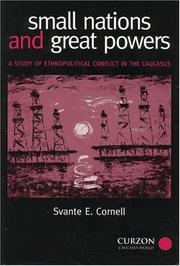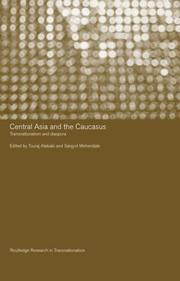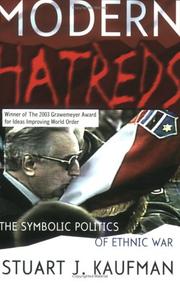| Listing 1 - 5 of 5 |
Sort by
|

ISBN: 0700711627 9780700711628 0203988876 9780203988879 9786610145263 6610145261 1135796696 1280145269 9781135796648 9781135796686 9781135796693 1135796688 Year: 2001 Publisher: Richmond : Curzon,
Abstract | Keywords | Export | Availability | Bookmark
 Loading...
Loading...Choose an application
- Reference Manager
- EndNote
- RefWorks (Direct export to RefWorks)
Introduces the geographical, historical and ethno-linguistic framework of the Caucasus, focusing on the Russian incorporation of the region, the root most conflicts; analyses individual conflicts, from their origins to the attempts at resolving them; analyses the role of the three regional powers (Turkey, Iran and Russia); and sets out a synthesis of the Caucasian conflicts and a conclusion on the place of the Caucasus in world affairs.
Caucasus --- Russia --- History --- Ethnic relations --- Politics and government --- RussiaHistory --- Caucasia --- Caucasus Mountains --- Caucasus Region --- Kavkaz --- History. --- Ethnic relations. --- Politics and government. --- Caucasus - History --- Caucasus - Ethnic relations --- Caucasus - Politics and government --- Russia - History

ISBN: 1134319940 0203602463 128010788X 0203495829 9780203495827 0415332605 9781134319893 9781134319930 9781134319947 9780415332606 9780415498982 0415498988 1134319932 Year: 2005 Volume: 17 Publisher: London: Routledge,
Abstract | Keywords | Export | Availability | Bookmark
 Loading...
Loading...Choose an application
- Reference Manager
- EndNote
- RefWorks (Direct export to RefWorks)
Since the collapse of the Soviet Union, a number of linkages have been established between newly independent Central Asian states, or populations within them, and diaspora ethnic groups. This book explores the roles that diaspora communities play in the recent and ongoing emergence of national identities in Central Asia and the Caucasus. The loyalties of these communities are divided between their countries of residence and those states that serve as homeland of their particular ethno-cultural nation, and are further complicated by connections with contested transnational notions of common
Nationalism --- Consciousness, National --- Identity, National --- National consciousness --- National identity --- International relations --- Patriotism --- Political science --- Autonomy and independence movements --- Internationalism --- Political messianism --- Asia, Central --- Caucasus --- Caucasia --- Caucasus Mountains --- Caucasus Region --- Kavkaz --- Ethnic relations. --- Ethnic relations --- Nationalism - Asia, Central --- Nationalism - Caucasus --- Asia, Central - Ethnic relations --- Caucasus - Ethnic relations

ISBN: 0801438020 0801487366 1501702009 1501701991 9781501702006 9780801438028 9780801487361 9781501701993 Year: 2001 Publisher: New York: Cornell university press,
Abstract | Keywords | Export | Availability | Bookmark
 Loading...
Loading...Choose an application
- Reference Manager
- EndNote
- RefWorks (Direct export to RefWorks)
Ethnic conflict has been the driving force of wars all over the world, yet it remains an enigma. What is it about ethnicity that breaks countries apart and drives people to acts of savage violence against their lifelong neighbors?Stuart Kaufman rejects the notion of permanent "ancient hatreds" as the answer. Dissatisfied as well with a purely rationalist explanation, he finds the roots of ethnic violence in myths and symbols, the stories ethnic groups tell about who they are. Ethnic wars, Kaufman argues, result from the politics of these myths and symbols-appeals to flags and faded glories that aim to stir emotions rather than to address interests. Popular hostility based on these myths impels groups to follow extremist leaders invoking such emotion-laden ethnic symbols. If ethnic domination becomes their goal, ethnic war is the likely result.Kaufman examines contemporary ethnic wars in the Caucasus and southeastern Europe. Drawing on information from a variety of sources, including visits to the regions and dozens of personal interviews, he demonstrates that diplomacy and economic incentives are not enough to prevent or end ethnic wars. The key to real conflict resolution is peacebuilding-the often-overlooked effort by nongovernmental organizations to change hostile attitudes at both the elite and the grassroots levels.
Atrocities --- Atrocités --- Europe, Eastern --- Caucasus --- Europe de l'Est --- Caucase --- Ethnic relations --- Political aspects --- Politics and government --- Relations interethniques --- Aspect politique --- Politique et gouvernement --- Political aspects. --- Politics and government. --- Atrocités --- Military atrocities --- Caucasia --- Caucasus Mountains --- Caucasus Region --- Kavkaz --- East Europe --- Eastern Europe --- Cruelty --- War crimes --- Atrocities - Europe, Eastern --- Europe, Eastern - Ethnic relations - Political aspects --- Europe, Eastern - Politics and government - 1989 --- -Caucasus - Ethnic relations - Political aspects --- Caucasus - Politics and government
Book
ISBN: 1441996656 1441996664 Year: 2011 Publisher: New York, NY : Springer New York : Imprint: Springer,
Abstract | Keywords | Export | Availability | Bookmark
 Loading...
Loading...Choose an application
- Reference Manager
- EndNote
- RefWorks (Direct export to RefWorks)
The internment of civilian and military prisoners became an increasingly common feature of conflicts in the twentieth century and into the twenty-first. Prison camps, though often hastily constructed and just as quickly destroyed, have left their marks in the archaeological record. Due to both their temporary nature and their often sensitive political contexts, places of internment present a unique challenge to archaeologists and heritage managers. As archaeologists have begun to explore the material remains of internment using a range of methods, these interdisciplinary studies have demonstrated the potential to connect individual memories and historical debates to the fragmentary material remains. Archaeologies of Internment brings together in one volume a range of methodological and theoretical approaches to this developing field. The contributions are geographically and temporally diverse, ranging from Second World War internment in Europe and the USA to prison islands of the Greek Civil War, South African labor camps, and the secret detention centers of the Argentinean Junta and the East German Stasi. These studies have powerful social, cultural, political, and emotive implications, particularly in societies in which historical narratives of oppression and genocide have themselves been suppressed. By repopulating the historical narratives with individuals and grounding them in the material remains, it is hoped that they might become, at least in some cases, archaeologies of liberation.
Caucasus -- Civilization. --- Caucasus -- Ethnic relations. --- Caucasus -- History. --- Archaeology --- Archaeology and history --- Material culture --- Concentration camps --- Prisoner-of-war camps --- Imprisonment --- War and society --- Anthropology --- Social Welfare & Social Work --- History & Archaeology --- Social Sciences --- Criminology, Penology & Juvenile Delinquency --- Social & Cultural Anthropology --- Social aspects --- Excavations (Archaeology) --- Archaeology. --- Archeology --- Archaeological digs --- Archaeological excavations --- Digs (Archaeology) --- Excavation sites (Archaeology) --- Ruins --- Sites, Excavation (Archaeology) --- Social sciences. --- Cultural heritage. --- Social Sciences. --- Cultural Heritage. --- Auxiliary sciences of history --- History --- Antiquities --- Cultural heritage --- Cultural patrimony --- Cultural resources --- Heritage property --- National heritage --- National patrimony --- National treasure --- Patrimony, Cultural --- Treasure, National --- Property --- World Heritage areas --- Cultural property.
Book
ISBN: 9789004179011 9004179011 9786612786426 9047441362 1282786423 9789047441366 9781282786424 Year: 2010 Volume: 1 Publisher: Leiden: Brill,
Abstract | Keywords | Export | Availability | Bookmark
 Loading...
Loading...Choose an application
- Reference Manager
- EndNote
- RefWorks (Direct export to RefWorks)
State building processes in the Caucasus are influenced by the culture of the Caucasus, and previous experiences with state building after World War I. The conflicts which erupted at the time have influenced territorial claims. The role of foreign powers as Russia, the United States, Turkey, Germany is considerable in the region. Divide and rule policy of Joseph Stalin is another factor which describes existing animosities between peoples in the Caucasus. Since 1989 a transition process, or state building process, has started in the North and the South Caucasus. This book gives an in-depth analysis of the backgrounds of the conflicts, including activities by IGO's and NGOs, and the developments in international law with regard to state building practice.
Nation-building --- Ethnic conflict --- Social conflict --- Political violence --- Conflict management --- History --- Caucasus --- Ethnic relations --- Politics and government --- Reconstruction d'une nation --- Conflits ethniques --- Lutte des classes --- Violence politique --- Gestion des conflits --- History. --- Histoire --- Caucase --- Ethnic relations. --- Politics and government. --- Relations interethniques --- Politique et gouvernement --- CONFLICT RESOLUTION -- 327.5 --- Conflict control --- Conflict resolution --- Dispute settlement --- Management of conflict --- Managing conflict --- Management --- Negotiation --- Problem solving --- Crisis management --- Violence --- Political crimes and offenses --- Terrorism --- Class conflict --- Class struggle --- Conflict, Social --- Social tensions --- Interpersonal conflict --- Social psychology --- Sociology --- Conflict, Ethnic --- Ethnic violence --- Inter-ethnic conflict --- Interethnic conflict --- Stabilization and reconstruction (International relations) --- State-building --- Political development --- Caucasia --- Caucasus Mountains --- Caucasus Region --- Kavkaz --- Nation-building - Caucasus - History --- Ethnic conflict - Caucasus - History --- Social conflict - Caucasus - History --- Political violence - Caucasus - History --- Conflict management - Caucasus - History --- Caucasus - History --- Caucasus - Ethnic relations --- Caucasus - Politics and government
| Listing 1 - 5 of 5 |
Sort by
|

 Search
Search Feedback
Feedback About UniCat
About UniCat  Help
Help News
News